Reviews
‘Witchboard’ Review : New Coven, Who Dis?
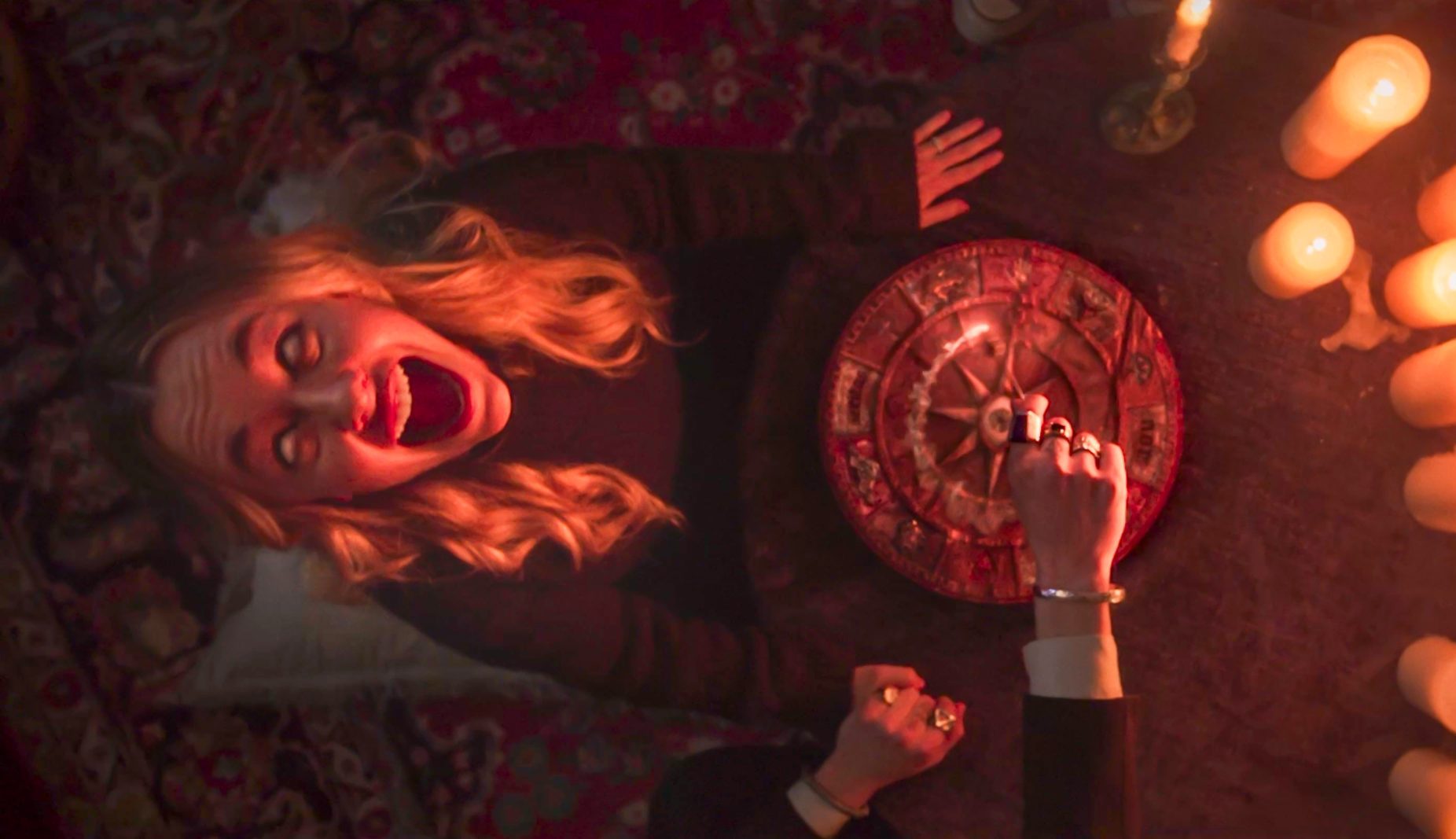
Those of us hoping Chuck Russell’s Witchboard remake would be a pleasant surprise found ourselves with a mixed bag. At times, it feels like 1990s supernatural fodder blended with a knockoff of a CW horror drama aimed at tweens. This is sad because most of us were assuming this take on Kevin Tenney’s 1986 film of the same name would be fun. Or at least push the envelope forward as it is being reimagined nearly forty years later.
Witchboard Returns With An R Rating
Another reason some of us were excited to see Witchboard is that Russell directed, produced, and co-wrote this reimagining. He helmed The Blob and A Nightmare on Elm Street 3: Dream Warriors, so he knows what a fun horror movie should look like. However, we are met with a 112-minute runtime that is unearned. While this film has little in common with the original, it also avoids ever doing anything too interesting. Instead, it settles on a rather pedestrian and frustratingly predictable tale that lacks thrills. The film has an R rating, and I have no clue how it achieved that with its almost basic cable sensibilities.

Some Missed Opportunities
This iteration of Witchboard is set in present-day New Orleans. Emily (Madison Iseman), Christian (Aaron Dominguez), and some of their friends are opening a restaurant in the French Quarter. However, those plans are derailed when Emily finds (and becomes obsessed with) the cursed board. She unknowingly falls for a trap set by a vengeful witch willing to kill for her own gains. Yet, all of the reveals are toothless, and none of the attempted scares land. So, this movie feels very paint-by-the-numbers, and you can see where it’s going from the very beginning. Instead of making this one-note story fun or exciting, the team serves a very bland movie.
We soon find out that Emily battled to get sober not so long ago, as it comes up a lot. Her fiancé continually asks her if she’s using again. His friend/ex-girlfriend Brooke (Melanie Jarnson) explains Emily’s addictive personality is the reason she’s such an easy target for the board. We even get her former dealer trying to catch her at a funeral and calling to offer her heroin. Witchboard harps on Emily’s past but never does anything with it aside from reminding her and the audience about it. It’s one of the many things that feel underdeveloped in this film.
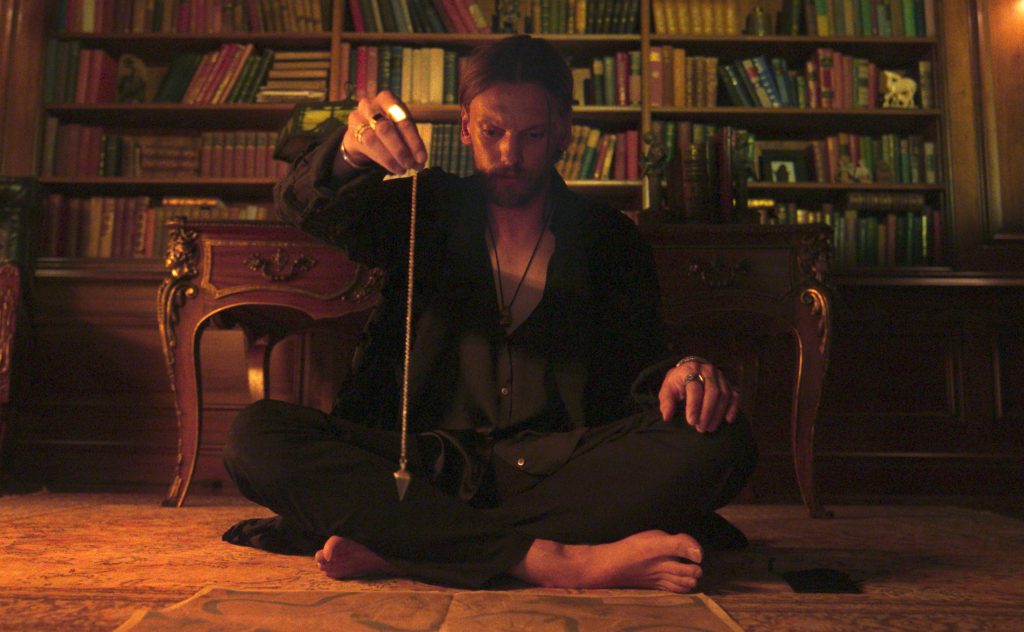
Subtly Doesn’t Exist in Witchboard
Through completely obvious and predictable means, Alexander Babtiste (Jamie Campbell Bower) gets involved with this couple and this cursed item. He’s an occult expert who is asked to help save Emily’s soul, but the script doesn’t do anything subtly. Witchboard announces he’s the big bad from the beginning, so we have to suspect everyone who works with him is also evil. While Bower gives one of the stronger performances, his character is written like a cartoon villain. This especially hurts because wherever you land on Stranger Things, you know Bower can play a damn good bad guy. However, he’s sadly one of the many wasted opportunities in this film.
While this version of Witchboard should be more modern, bold, and scary, it curiously feels like it takes many steps backward. The original film had a bromance that felt like it would have been a romance in more modern times. This new version shoves away that glimmer of queerness and instead makes the main trio of characters very hetero. However, you almost forget to throw tomatoes for those reasons because the casting department has given us another prime example of why we have to start having more conversations about colorism.
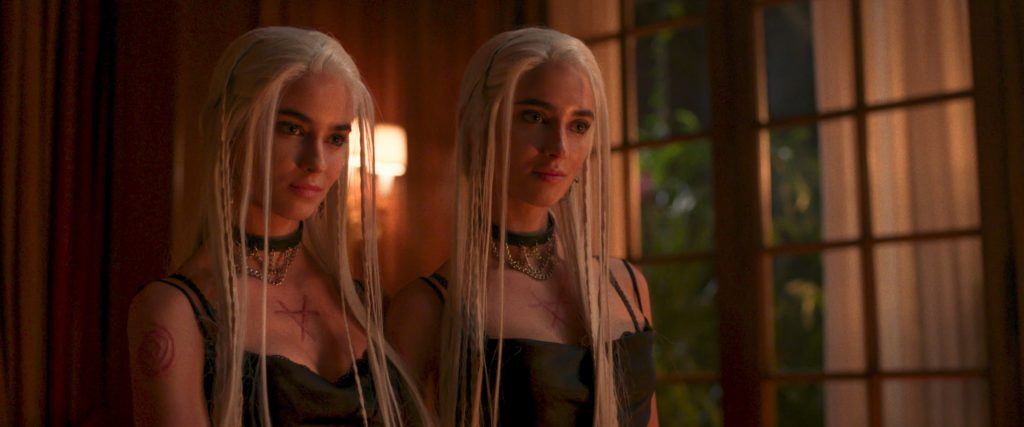
And Another Thing!
This movie is set in New Orleans. However, I can count the Black actors with dialog on one finger, and the Black actors I saw on screen with one hand. They were able to hire a few more to be bodies when things go down later in the film. While I am begging for more POC representation in general, I can’t help noticing the media’s aversion to casting actors with darker skin tones. It’s almost as if the powers that be aren’t aware that POC can have a variety of skin tones. I write this while looking at my own pasty legs and glaring at my computer.
This is not to take away from how happy I was to see Dominguez and Jarnson on screen. If anything, I would love to see them in better movies so I can see what they are actually capable of. However, I am also tired of the industry-wide problem. We have seen so many horror movies this summer, which also didn’t get the memo that Brown people can be Brown.
Why Remake Witchboard?
I cannot say Witchboard is a good time. I tried to convince myself that it might be so bad it’s good, but that would be a lie. Aside from the embarrassingly bad CGI and a few smartphones, there is nothing to really anchor this movie in this decade. It could’ve easily been a late ’80s or early ’90s effort. Which begs the question, why this remake now? If it doesn’t want to be in conversation with anything going on today, why touch the IP? It would have been cool to push the premise forward for a more modern audience. Instead, we have a toothless reimagining that overstayed its welcome. For why? For Whomst?
Reviews
‘Re-Animator’ Review: The Lasting Legacy of a Horror Comedy
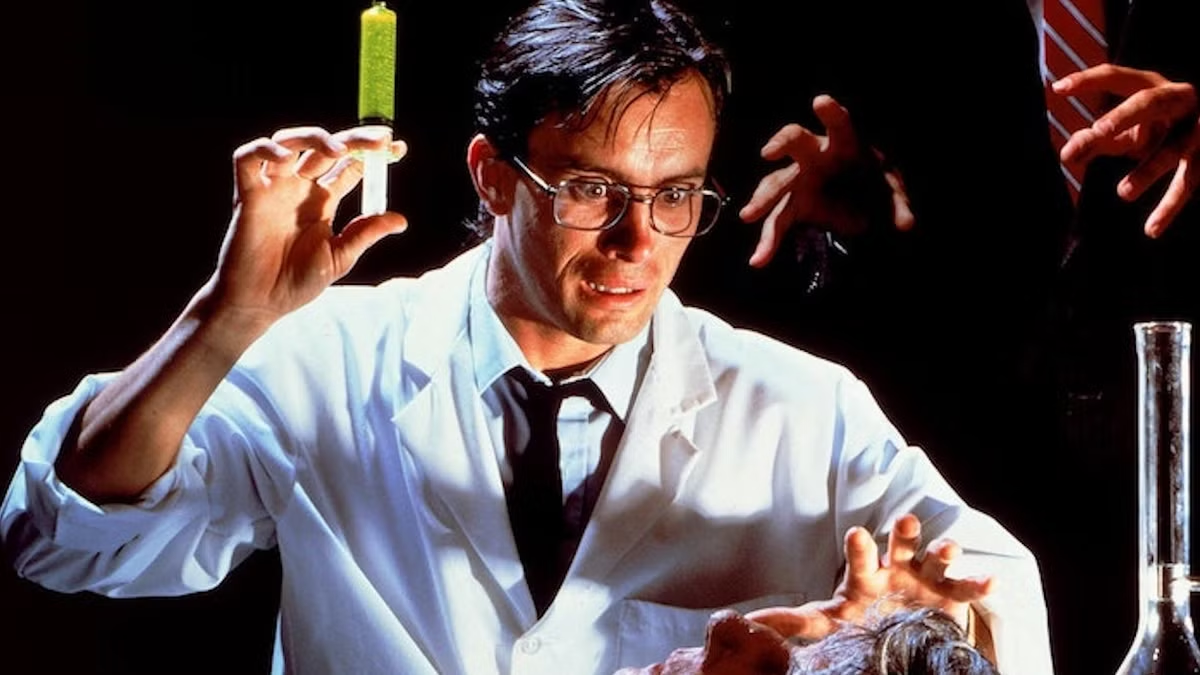
I can’t remember the first time I saw Re-Animator. While this will probably piss someone off, my first real introduction to a variation of the source material was with Joshua Chaplinsky’s Kanye West – Reanimator. Maybe I had seen the film before that, but I wasn’t certain. I decided to go back and watch (or rewatch) the film to compare it to the satirical book. To my surprise, I loved it! I’m not sure why I didn’t remember watching the film, but I was so enthralled that I wanted to make my second tattoo a Re-Animator tattoo! Five tattoos later, and I still don’t have one.
What is Re-Animator About?
Daniel Cain (Bruce Abbott) is a medical student at Miskatonic University, along with his girlfriend Megan Halsey (Barbara Crampton)… Megan just happens to be the daughter of Dean Halsey (Robert Sampson). Herbert West (Jeffrey Combs), who recently transferred to Miskatonic, finds a posting with a room for rent at Daniel’s. Paying with a fat stack of cash, Herbert quickly moves into Daniel’s and gets down to business. The only problem is, Herbert’s business is reanimating the dead.
As someone who has been adamant about not liking horror comedies, Re-Animator really tickles me in a way most don’t. There’s a supremely dark tone to this film that is brightened by the overly campy performances, deadpan jokes, and brutally funny practical effects. Re-Animator is one of the rare films that could have been singularly played for laughs or fear, but exists in this middle ground where it’s the best of both worlds. While this film isn’t deep enough to glean new meanings or gain profound lessons, each rewatch never ceases to be less enjoyable than the last.
One of the Best Lovecraft Adaptations
Writers Dennis Paoli, William J. Norris, and Stuart Gordon took (racist) H.P. Lovecraft’s Herbert West–Reanimator and unknowingly made one of the best Lovecraft adaptations to date. There’s a peculiar phenomenon in horror where films attempt to be overly Lovecraftian, much like the genre’s tendency to label films as Lynchian. What people don’t get about Lovecraft is that not everything was all tentacles and otherworldly. Obviously, there’s a level of that that plays into what Lovecraft was. I would personally label Re-Animator, along with In the Mouth of Madness and Color out of Space, as the best three Lovecraft adaptations/Lovecraftian films to date.
There’s little to say about a film like Re-Animator that hasn’t been said already, but there is one specific point that needs to be echoed. Well, two. Firstly, Re-Animator was director Stuart Gordon’s directorial debut. His insistence on creating a viscerally nasty, sexy, funny debut film was important to set his name apart from others. Stuart Gordon came out swinging and, throughout his career, didn’t stop swinging.
The second point that needs to be echoed is just how amazing the film’s practical effects are. Whether it’s the played-for-laughs cat puppet or Dr. Carl Hill’s (David Gale) decapitated head, each practical moment is handled with dignity, care, and the utmost beauty. While a handful of shots may not hold up as much now as they did in the 80s, the practical effects that grace Re-Animator rival some of the rare practical effects that are used today.
Why Re-Animator Still Matters in Horror History
If you haven’t seen Re-Animator, what are you doing? It’s full of brilliant, campy performances that could be a masterclass in Horror Acting for Screen 101. Barbara Crampton is a gorgeous badass, Bruce Abbott is a hilariously hapless himbo, and Jeffrey Combs showed how he was cultivating his career to be exactly what he wanted it to be. A film like Re-Animator will live on in horror history for the rest of time. My only question is…how hasn’t there been a (yuck) remake yet?
Reviews
‘Iron Lung’ Review: Exceptionally Atmospheric Cosmic Horror
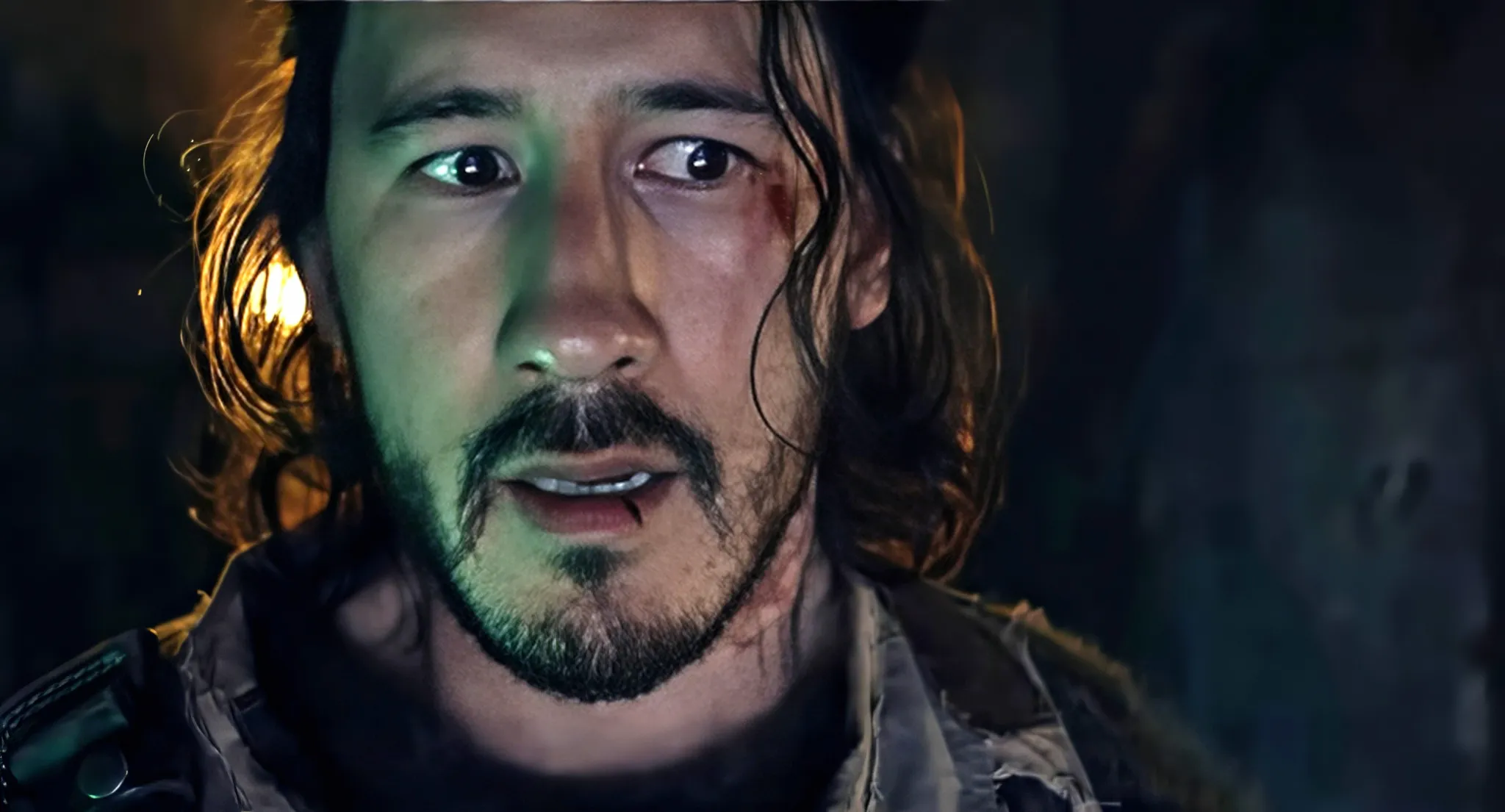
As Iron Lung begins, the film places you in an overhead shot looking down at a submarine that’s seen better days. Jagged metal teeth of a broken cage sit at its head, illuminated by a light from the ship above that’s about to cut it loose. As you’re about to be dropped into a roiling ocean of blood, you become quickly invested in its story.
A dire paternal voiceover runs you through your place in the world as an observer: someone is being sent into the “waters” of a far-off moon in a dead, dark galaxy. They’re in search of an answer you’re automatically aware will never be enough and a penance they will never attain. It prompts an obvious, cutting question: if Hell is where we’re looking for an answer, how bad must things be among the stars to go searching there for hope?
A Surprising Outing for Writer and Director Mark Fischbach
The debut feature film of writer and director Mark Fischbach, better known to the internet at large as Markiplier, is as surprising as it is atmospheric. And no, not surprising because Fischbach is an internet personality crossing over into film. And no, not surprising because this is a video game adaptation that is actually quite good.
The surprise here is mainly from the way Fischbach dodges a number of first-time filmmaker torpedoes that would otherwise sink the film straight to the sea floor. It’s in the very clear coordination and trust he has with his cast and crew. In a way, the film itself is a mirror of the submersible his character is forced to pilot: flawed, surely, but strong enough to complete its mission and deliver an exceptional experience.
What Is Iron Lung About Exactly?
The story goes as follows: in the wake of an event called the Quiet Rapture, the stars themselves have been snuffed out. Most of the galaxy has been plunged into sudden darkness, and a mass dying off has consumed countless worlds (think the worst possible aftermath to The Nine Billion Names of God).
Convicted for a reprehensible crime, the convict Simon (played by Markiplier himself) has been given a rare opportunity to return to life among the survivors. The mission is to pilot a death trap of a one-man submarine into the blood oceans of an alien moon, looking for a scientific sample useful enough to earn his freedom. That is, assuming he doesn’t lose his mind or his life in the process.
Bespoke Set Design That Matches the Premise Perfectly
Iron Lung should be commended first and foremost for being a bottle film with the perfect set design to match. Not overly ambitious, but not too simplistic either. Contained in a marvel of a small space, the submarine here is a tactile nightmare of rusty metal and antiquated technology you never get sick of seeing more of.
While Fischbach and director of photography Philip Roy have the camera linger in close ups almost too often, I don’t blame them for wanting to capture the finer details and leer at them. It’s clear every inch of this condensation covered machine was engineered by the art team and production design to emphasize its prison cell qualities as a barely functional vessel.
The ship’s external camera fires off like a flash bulb on its interior, barely illuminating the cabin with its next horrific image of the sea floor before plunging us back into darkness. The oxygen gauge and its cold robotic voice are a countdown to the painful annihilation that awaits its pilot. Its proximity sensors give only the barest indications of what’s going on outside, ticking a dull noise warning us: you are not alone. It’s a punishment to operate, and the set design as well as the very solid sound design that accompany it make that violently clear and effectively spinetingling.
Translation From Game to Film Isn’t So Perfect Though
This perfect setting isn’t always used perfectly though. The translation of the game’s mechanics and gameplay to the screen are both a weakness and a strength. They make the pacing of the first third run to a slow start, especially when Fischbach’s screenplay grinds against the strong suit of the film’s cinematography: the panic of it all.
Like its video game source material, David Szymanski’s Iron Lung, the film is really at its best when it’s instilling a sense of active and imminent panic. A tone that matches the borrowed time the submarine is glued together with. Putting out fires, both literal and metaphorical, ratcheting up its claustrophobia as you’re placed cheek to cheek with Simon in steamy, metallic darkness. This is where Iron Lung shines.
Markiplier’s Performance in Iron Lung is Hit or Miss, But Mostly Hits
It’s outside of these moments of panic where the weakest parts of the script and Fischbach’s performance are highlighted. Some weak line deliveries and beats of dead air kill the real tight headlock the film could have you gripped in from start to finish. And while Fischbach is phenomenal at playing terrified or pleading or even simple exhaustion in the face of the impossible, he really requires someone to bounce off of as his solo work just isn’t as compelling. Even the clunkiest bits of dialogue between him and his jailer (Caroline Kaplan) are better than the best of his moments where he talks to himself or tries to inject some humor into the bleak story.
This is a shame too, because the minimalist storytelling and background we get for his character is genuinely very intriguing. It’s thematically rich for what the film is trying to say about the power and terror of belief, and it’s doubly satisfying that the film has enough confidence to not lay everything out in a longwinded speech explaining the motives and lore that landed him here.
All that being said, his performance is hit or miss, but he mostly hits. The dialogue becomes more urgent as we approach the climax, and all of the cast delivers on that impending doom nicely. It reaches its peak in the final act, and Fischbach is on fire as he struggles to hold himself together in the face of absolute madness leaching its way into the pressurized cabin.
Iron Lung: A Redemptive Finale With Pure Liquid Body Horror
What a fantastic final act it is, one that makes up for its imperfection in the first two parts with a homerun of pure liquid body horror. It’s just phenomenal how the film’s digital and practical effects present the true horrors of Iron Lung. There’s a near perfect mesh between the two, and they highlight the best influences of similar genre films that came before.
Soaked with all the gore, madness, and mystery of the likes of Event Horizon and Pandorum, Iron Lung is a worthy successor in the cosmic horror genre as it rises above its own problems. It’s a moody, environmentally precise stunner of a horror film that sets a benchmark as the movie to beat for forthcoming releases this year.























